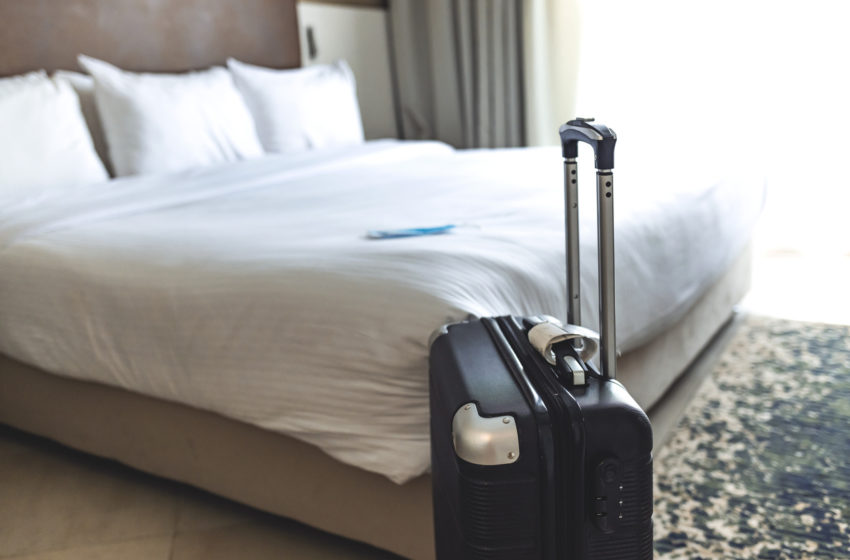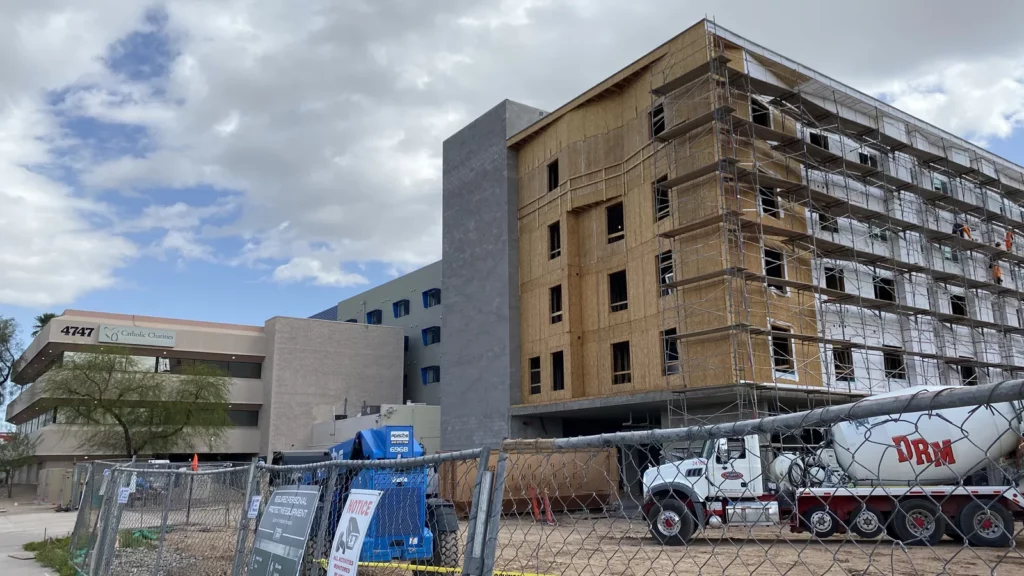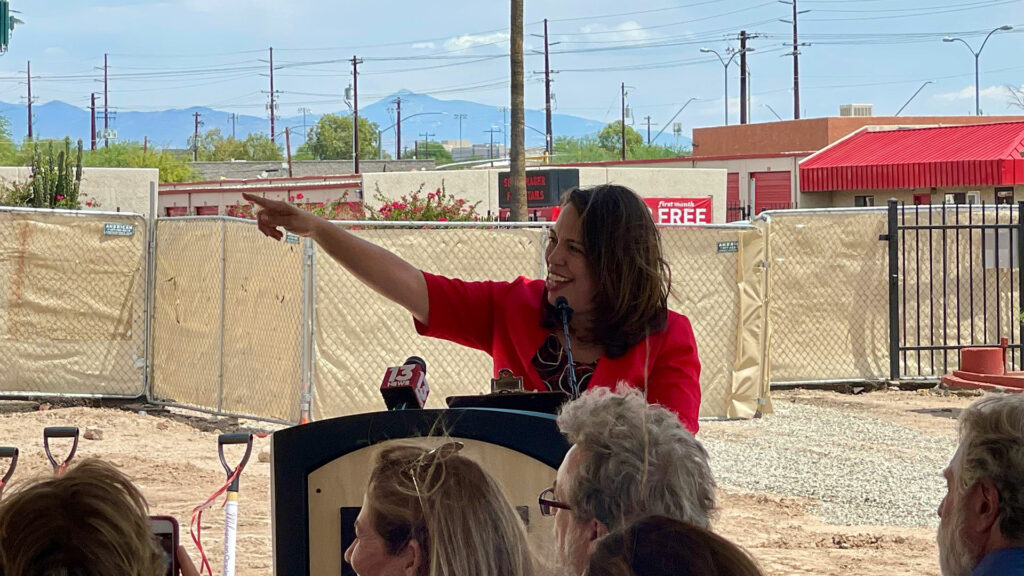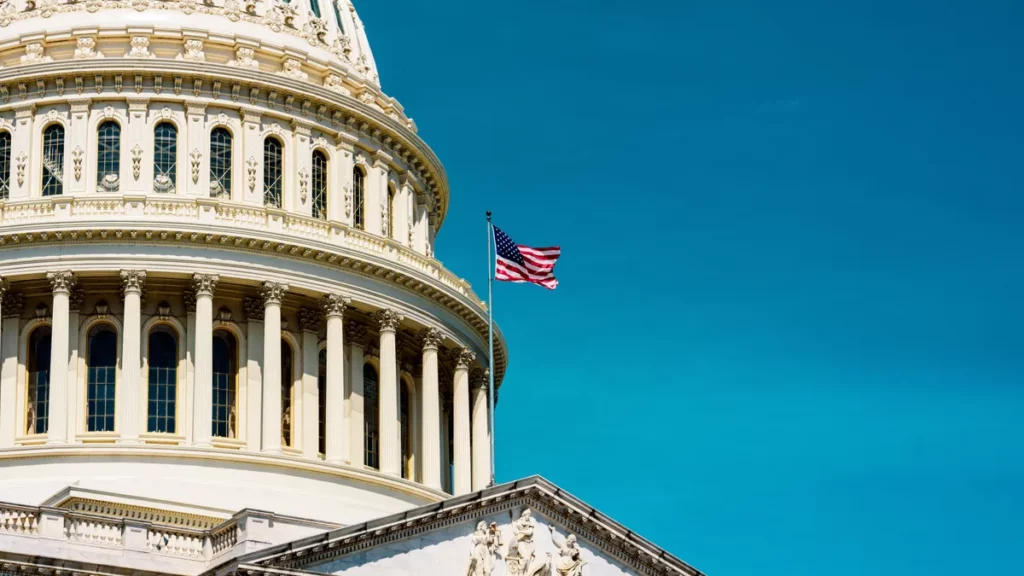What We Lost When Hotels Stopped Being Housing

Close up of black luggage and surgical mask. Hotel room bed background, copy space for text, Traveling in new normal lifestyle concept. Stay safe while travel during Covid 19 pandemic concept.
AILSA CHANG, HOST:
Nearly four years ago, the last remaining residents of the Merkle Hotel in Tacoma, Wash., were teetering on the edge of disaster, of homelessness. Kathy Dour was one of those people.
KATHY DOUR: We don’t have a place to go yet. We’re just standing in the wind right now, just waiting.
CHANG: Now, the Merkle wasn’t a hotel in the sense you typically think of a hotel. It was essentially an apartment building – one-room units, low rent, no kitchens. It had been purchased by a developer with plans to renovate and convert it to more expensive housing. So he was forcing the tenants out.
WILL JAMES, BYLINE: I was standing in the lobby with some of the remaining tenants that night, and it was a really tense scene.
CHANG: Will James covered the story for KNKX Public Radio.
JAMES: And what I remember is walking around and asking people, you know, you have a few hours left before this deadline. Where are you going to go? What are you going to do tonight? And people still didn’t know.
CHANG: The landlord provided the tenants $500 each in relocation assistance and waived their last month’s rent. City officials and non-profits tried to help them find new housing. But these residents were, in many cases, barely staying afloat. Some had histories of heroin use. Some had criminal records. And almost all of them were living on disability payments that amounted to about $750 a month. And they were about to be forced into a housing market with soaring rents.
JAMES: I had covered homelessness on the West Coast for several years at that point, but I had never watched homelessness happening in real time. And it became clear at that moment that that’s what I was seeing.
CHANG: The story stuck with James. And late last year, he tried to find the people who had lived at the Merkle to find out what had become of them three years later. Of the 12 residents he was able to track down, six had spent time homeless. Five had died, including the woman we heard at the beginning, Kathy Dour.
JAMES: She told me back in 2018 that she was nervous about leaving because she needed a van to take her to dialysis appointments three times a week and she needed to provide an address to that van service.
CHANG: Dour’s brother told James that she had spent time homeless after leaving the Merkle and she had started to miss dialysis appointments.
JAMES: And shortly after she left the building, she collapsed in a bank in Tacoma, ended up in the hospital. And eight months after she left that building, she was dead.
CHANG: Al Bari, another resident, did manage to find a new apartment. He said these deaths were devastating.
AL BARI: It’s just hard. It didn’t have to be that way. What would have been nice is if they already had property already set up for us to even move to.
(SOUNDBITE OF MUSIC)
CHANG: Some residents described the Merkle Hotel as just a step above living on the streets. It had been infested with bedbugs, and at one point, a nightclub on the ground floor regularly blasted music into the early hours. James said it was not a nice place to live.
JAMES: In fact, it was a really bad place to live. And nobody who lived there looks back on it fondly. But they say it was their last foothold in this city, Tacoma, that had gotten, like many West Coast cities, incredibly, incredibly expensive over the years.
CHANG: And buildings like the Merkle, those last footholds keeping people out of homelessness, they have all but vanished in Tacoma and all around the country. So CONSIDER THIS – from single room occupancies to boarding houses to grand institutions, extended-stay hotels used to provide accommodation for all sorts of people in this country, but they virtually disappeared. We will talk to a journalist who argues it’s time for a comeback.
(SOUNDBITE OF MUSIC)
CHANG: From NPR, I’m Ailsa Chang. It’s Wednesday, July 27.
It’s CONSIDER THIS FROM NPR. Now, you’ve probably heard by now there is an enormous housing shortage across the country. There is debate among economists about precisely how bad it is. But here’s one estimate.
MIKE KINGSELLA: America’s fallen 3.8 million homes short of meeting housing needs, and that’s both rental housing and ownership.
CHANG: That’s Mike Kingsella with a nonprofit called Up for Growth. It’s a research group made up of affordable housing and industry groups. They put out a study this month of 800 different cities and towns looking at whether the housing supply met the need. And the findings were not pretty.
KINGSELLA: In Los Angeles, for instance, which is the most underproduced metro in the country, it’s lacking 8.4% – nearly 400,000 homes missing across the region.
CHANG: Meaning based on its population, Los Angeles would need 400,000 more homes to meet current demand. And hundreds of cities and towns are in the same boat.
(SOUNDBITE OF MUSIC)
CHANG: So housing of all types is in short supply. But there’s one type of housing that has virtually disappeared – one you probably don’t even think of as housing at all. What I’m talking about is the hotel.
HENRY GRABAR: The hotel was a central part of the housing landscape in U.S. cities up until the middle of the 20th century.
CHANG: That’s journalist Henry Grabar, who dug into the surprising history of hotels for Slate. He argues that the flexible, furnished, medium-term accommodation that residential hotels once provided could help solve a lot of the problems in our housing market today. And to understand how, you have to understand how wide the definition of hotel used to be. It spanned from single room occupancies for people with low incomes all the way to Suite 1806 at the Lexington Hotel in Manhattan, where newlyweds Joe DiMaggio and Marilyn Monroe once lived.
GRABAR: For people who are at the very top, they offered this sort of all-included lifestyle where, you know, you could get room service, someone would come clean, make your bed every day. But further down the income ladder, they were also really important. You know, in the early 20th century, families would live in hotels because they spared women usually the labor of furnishing a place, cleaning a place, decorating a place. And then further down the income ladder still, for single people, hotels were often the first place they went when they left home. The hotel was really the place that you went when you first arrived in a city, and you would rent a room by the week or by the month. And this was sort of your entry point into the city’s housing system.
CHANG: OK. So it used to be a thing where hotels were viewed as just sort of another type of housing for a lot of people, people all over the income spectrum. When and how did that begin to change?
GRABAR: I think there’s two things that happened. In the middle of the 20th century, to some extent, our need for residential hotels starts to disappear. The federal government subsidizes the development of suburbia. Homeownership becomes cheaper and more accessible than at any point in the country’s history. New economic models compete with the hotel and offer the thing that the hotel had long offered. I’m talking about places like retirement homes, right? Like, hotels were a big source of naturally occurring housing for the elderly. And retirement homes kind of fill that niche. Timeshares do a similar thing for vacation communities. So to some extent, the residential hotel declines because we don’t need it anymore. But there’s another part of this story, which is that there was a tremendous moral opposition to hotel life.
CHANG: Right. What did they fear about life in a hotel?
GRABAR: Yeah. In the beginning, I think, there was suspicion that hotels were places where women in particular would not focus on basically homemaking because a lot of those functions were taken care of by the hotel, and they were also social environments. And so there was a lot of suspicion of the sort of lively social life in hotels. There was a lot of moral opposition to that. Later in the 20th century, there was a more concerted opposition to the idea that residential hotels were places where drunks and hobos and prostitutes would live. And that was one of the big reasons that there was such a concerted opposition to hotel living in the middle of the 20th century. And cities actually undertook to basically get rid of residential hotels. And to a large extent, they were successful.
CHANG: Right. So as the housing that these hotels used to provide began to diminish, what did that mean for the groups of people who used to rely on this kind of housing? And I would like you to first focus on people who may have lived in a single room occupancy building because they couldn’t afford a typical apartment. Where did those people end up going?
GRABAR: So at the bottom end of the residential hotel picture was always something called the single room occupancy. Those were places where people would rent rooms – often single adults. They would rent rooms that maybe didn’t – they certainly didn’t come with their own kitchens. They often didn’t come with their own bathrooms. We’re talking really just the bare minimum, and then some of those facilities would be shared. And that was the place that people ended up when they had nowhere else to go.
And when cities began to target SROs for demolition, beginning with urban renewal, and then later tried to zone them out of existence in the ’60s and ’70s, the people who lived in the SROs really had nowhere to go. And I think there’s now a consensus that the abolition of SRO housing in cities is one of the reasons that we now suffer from such a serious homelessness crisis, because this bottom rung on the ladder of the housing system has been completely eliminated.
CHANG: But we should be clear, like many of these single-room occupancy buildings, these SROs, they were horrible places to live. Like, it’s not uncommon to hear stories about roaches or bedbugs, housing code violations, issues with crime. I mean, how nostalgic should we really be about the disappearance of SROs, you think?
GRABAR: No doubt. Yeah. I’m not trying to sugarcoat the living conditions in SROs. And I think to some extent what you’re talking about is, it’s a long debate in the history of American housing reform between the desire to improve conditions through regulation, through inspection, and also the recognition that if you impose too many conditions on various housing types, you might end up eliminating them entirely. And I just want to put some numbers to the decline of the SRO. New York lost 100,000 SRO units in the ’70s and ’80s. Los Angeles and Seattle lost half their SROs. So however bad the conditions may have been, the question is, where did those people end up afterwards? Did we provide an alternative for them as we eliminated the SRO? And the answer is no, we didn’t.
CHANG: It’s as you say in your piece, I mean, there has been this constant struggle between maintaining some standard of habitability and housing, but also not getting rid of too much supply because people need a place to live.
GRABAR: Yeah. And I think with SROs, reformers are right to focus on dangerous, unsanitary conditions in SROs and ask, how can this be improved? What can we do to make sure that the people who wind up living in these places can live with dignity? But I do not think that should be confused with the idea that an SRO hotel is an uncivilized form of housing that ought to be eliminated.
CHANG: So beyond lower-income people who would more heavily rely on SROs in the past, what other groups of people have been affected visibly now that long-term hotels aren’t really available?
GRABAR: I think the biggest result of our elimination of the residential hotel is the rise of Airbnb. Stays of longer than a month now make up a quarter of the company’s bookings. It’s the fastest-growing line of business that the company has. So it’s clear that the desire that Americans have to go someplace for weeks at a time never went away. And because we have lost the residential hotel, Airbnb is filling that niche. And that’s very problematic because Airbnb takes units out of the long-term housing stock. And the question I think should be, why aren’t hotels still filling that role? And there are a lot of restrictions as a result of this sort of mid-century quest to abolish the residential hotel that prevent hotels from setting up shop in a lot of the neighborhoods where Airbnb is the most popular. So if you look at a place like New York City, for example, New York City has all but banned new hotel construction in most residential neighborhoods.
CHANG: You do say that you are seeing small signs that we could be returning to some of these long-term hotel models. What kind of signs are you seeing?
GRABAR: Yeah. The hotel industry is definitely hot on the idea of extended-stay hotels. There have been some big investments in this space in recent years. I read one report that suggests that 1 in 10 U.S. hotel rooms are now extended-stay rooms. So that is becoming a bigger part of the market. Some of that is aimed at traveling workers, but some of it, I think, is also aimed at people who have fallen out of the housing market. And these extended-stay rooms out in motels by the interstate make up basically the last step before homelessness, sort of fulfilling the same role that SROs once did, although obviously in a location where it’s much harder to see, that some of these hotels and motels are actually filling in on the bottom end of the housing market and keeping people out of homelessness.
CHANG: That was Henry Grabar, a staff writer at Slate.
(SOUNDBITE OF MUSIC)
CHANG: It’s CONSIDER THIS FROM NPR. I’m Ailsa Chang.






